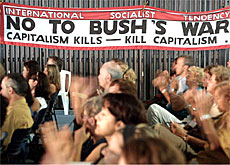Swiss prepare for anti-globalisation forum

As Switzerland gears up for the World Economic Forum summit, opponents of globalisation are converging on Porto Alegre, Brazil, for the World Social Forum.
Members of the Swiss parliament, government and non-governmental organisations are among the 100,000 people attending the gathering.
Set up to debate other means of globalisation, which respect human rights and democracy, the WSF in now in its third year.
It is billed as an alternative to the WEF annual meeting in the Swiss mountain resort of Davos and is deliberately held to coincide with that event.
Better world
This year a 30-strong Swiss team is joining 30,000 delegates in Porto Alegre to look for ways of making a better, fairer world.
The Swiss delegation includes parliamentarians, government and trade union officials, as well as representatives from NGOs.
They will be discussing a range of issues, such as sustainable development, human rights, democracy and the fight against militarism.
Among the speakers are well-known critics of globalisation, such as Bernard Cassen of the organisation ATTAC, the Indian writer and activist Arundathi Roy, and the United States academic Noam Chomsky.
Unlike the WEF meeting in Davos, few heads of state or people of influence are expected at the social forum. But in a publicity coup for the organisers, the newly-elected Brazilian president, Luiz Inacio da Silva – or Lula – has said he will attend.
Agreement unlikely
But Gérald Pachoud, who works at the Swiss foreign ministry’s human rights division, and who is attending the summit, believes the chances of reaching an agreement on any of the issues under discussion could prove difficult.
Pachoud also attended last year’s summit which ended without a clear statement.
“That was something that struck me. The goal of the summit is not really to achieve anything,” he told swissinfo.
“Some people within this movement want to have a political statement but the groups are so different that it’s not possible. This was a conclusion they reached last year: that they cannot have one single message at the end of the meeting.”
Swiss presence
Yet despite the likelihood of Porto Alegre ending once again without a clear message, Pachoud said it was crucial that the Swiss attended.
“It is a rather unique opportunity to see and to meet people within the different movements which are against globalisation,” he said.
“If one of your goals is to maintain or develop dialogue then the goal is achieved, because 30,000 people is a lot of people.”
The WSF developed in 2000 out of a simple desire to give organisations and individuals a forum to discuss their opposition to globalisation.
Pachoud insists it has now become an important alternative to the WEF meeting, which runs parallel to the WSF from January 23-28.
“The first year was mainly a reaction against the WEF and we didn’t know exactly what was going to happen,” explained Pachoud. “The fact that it’s now in its third year shows that it is a sustainable movement.”
swissinfo, Jacob Greber and Billi Bierling
The third meeting of the World Social Forum runs from January 23-28 in Porto Alegre, Brazil.
The WSF was created in 2000 as an alternative to the World Economic Forum held annually in Davos, Switzerland.
The forum expects to attract 100,000 people, including 30,000 delegates.
Members of the Swiss parliament, government department and NGOs are taking part in the event.

In compliance with the JTI standards
More: SWI swissinfo.ch certified by the Journalism Trust Initiative
You can find an overview of ongoing debates with our journalists here. Please join us!
If you want to start a conversation about a topic raised in this article or want to report factual errors, email us at english@swissinfo.ch.